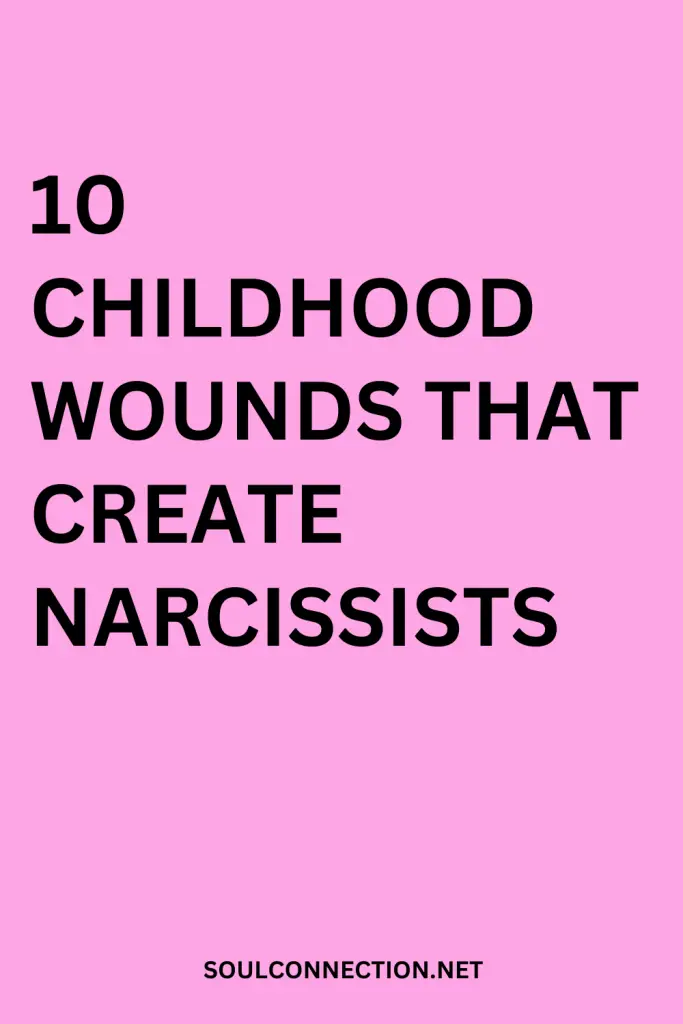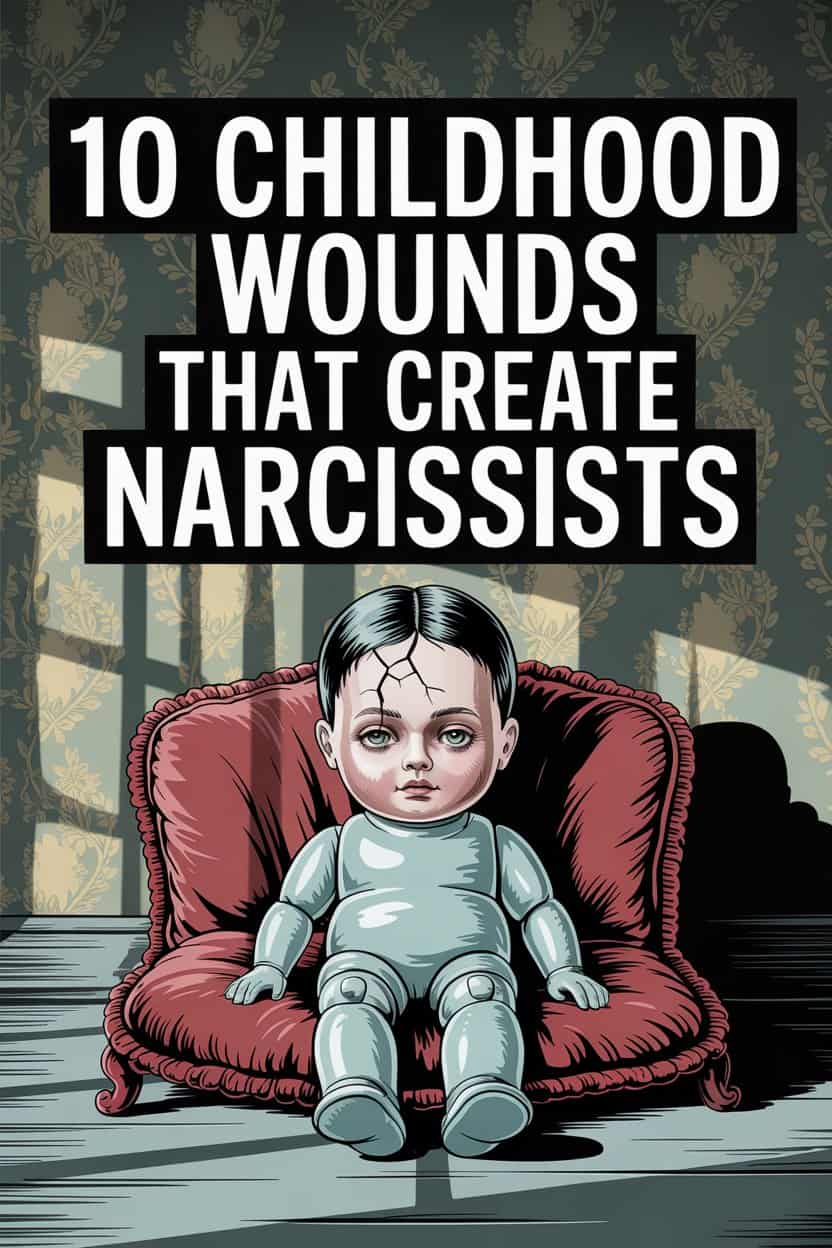Few of us exit childhood without a few battle scars, but some wounds leave more than a funny story or an awkward family dinner memory. Certain types of emotional injuries all but roll out the red carpet for narcissistic traits later in life.
If your partner seems to have taken “main character energy” a tad too literally, or if you’re wondering why you keep attracting people who think the world revolves around their coffee order—well, the root often goes way back.
Here’s a closer look at the ten most common childhood landmines that can create full-blown narcissists.
If your partner (or, let’s be honest, your ex) checks more than a few boxes, now’s the time to stop blaming yourself for their inability to apologize.
1. Parental Emotional Neglect
Picture a child trying to show their latest masterpiece to a parent who’s too busy scrolling through their phone or wrapped up in their own drama.
Consistently ignored or invalidated, that child learns very quickly: My feelings don’t count.
Later on, that hurt morphs into an outsized hunger for attention and admiration (preferably from a stadium full of adoring fans, but a captive dinner party will do).
Adults raised this way cling to the belief that if they’re loud enough, impressive enough, or dramatic enough, someone will finally see them.
If you’re living with this flavor of narcissism, expect lots of “me, me, me” conversations and roughly zero interest in how your day went.
2. Excessive Criticism or Unrealistic Expectations
Nothing speeds the journey to narcissism quite like a parent who nitpicks every move or expects a perfect report card, a flawless room, and Olympic-level piano recitals—simultaneously.
Children learn they’re never good enough, so they chase validation like it’s on sale.
To protect themselves from more criticism, they build an impenetrable fortress of self-importance. Inside, they’re still terrified of being exposed as “not enough.”
Outside, they’re busy reminding you (and your mother, and your barista) of their many, many talents. Spoiler: They might not take feedback well.
3. Conditional Love
Try growing up with parents who dole out affection like rare coins—only when you’re performing to their liking. Suddenly, love feels transactional.
Children internalize the belief that being worthy means being exceptional, perfect, or useful.
Years later, a grown-up narcissist expects relationships to revolve around their needs, successes, and whims. They’re convinced love is a prize for performance—preferably their own.
If you sense your partner’s affection dries up the minute you stop clapping, this old wound might be at work.
4. Being the “Golden Child” or Family Mascot
While some kids are ignored, others are hoisted onto family pedestals as the “chosen one.” Sounds glamorous—right up until the pressure to be perfect crushes any hope for a real self.
Every achievement is celebrated and every mistake swept under the rug, making it impossible to admit fault.
Later, this golden child expects the world to treat them like royalty—and throws a regal tantrum when anyone dares to disagree. Any criticism feels like betrayal, and apologies are about as rare as a unicorn in suburbia.
5. Absence of Healthy Boundaries
Parents who treat their child as a mini-adult, confidante, or emotional crutch teach them the world bends for their needs—or, in some cases, that their needs aren’t important at all. It’s a confusing cocktail.
These kids grow up without a clue about healthy limits, and suddenly everyone around them is expected to play by their rules. If you’re forever setting boundaries that get bulldozed, you’re dealing with the fallout from this particular wound.
6. Chronic Invalidation or Gaslighting
Ever had your feelings brushed aside with a “Don’t be so sensitive” or “That never happened”? Some kids learn to doubt their own reality before they even hit middle school.
Invalidation chips away at self-worth and breeds confusion about what’s real.
Adults who grow up in this funhouse mirror world often compensate by demanding their version of reality is the only one that exists.
Any disagreement feels like an existential threat, so they double down, argue, or rewrite history faster than you can say “revisionist.”
7. Witnessing or Experiencing Abuse
Physical, emotional, or psychological abuse leaves deep grooves in the psyche. For some, withdrawing and people-pleasing become survival tactics.
For others, the only way to avoid vulnerability is to go on the offensive—dominating, belittling, or controlling others before anyone can get too close.
This wound often creates narcissists who are especially vindictive or cruel when threatened. Empathy is a foreign concept, and loyalty is a one-way street.
8. Parentification or Caretaking Roles
When a child is required to care for a parent, manage siblings, or act as the family therapist, childhood gets replaced by responsibility. Now they’re in charge, but never truly allowed to be a child.
Fast-forward, and you’ve got an adult who expects everyone else to meet their emotional needs, just as they once met their parent’s. Relationships become transactional; if their endless contributions aren’t worshipped, expect fireworks.
9. Unpredictable or Inconsistent Parenting
Never knowing if a parent will show up with a hug or a hurricane of criticism leaves a child constantly on edge. Attachment becomes a gamble, and trust is for fools.
Adults who grew up like this become master manipulators, always testing if people will stick around. If they sense you drifting, prepare for a dramatic performance—or emotional sabotage. Chaos is their comfort zone.
10. Overindulgence or Excessive Praise
It might sound counterintuitive, but constantly telling a child they’re the best thing since sliced bread can backfire spectacularly. Lavishing endless praise teaches them that rules don’t apply and consequences are for other people.
When the real world (rudely) fails to agree, the grown-up version lashes out at anyone who dares to question their divine status. Genuine connection? Only if it comes with applause.
Healing Goes Both Ways
Living with someone shaped by these wounds isn’t for the faint of heart.
But there’s good news: recognizing these patterns is the first step toward change—whether you’re healing from narcissistic parents or managing a relationship with someone who’s still living out their childhood script.
If you spot yourself in any of these, take a breath. Wounds aren’t a life sentence, and therapy isn’t just for people with a podcast.
Relationships really can become less of a battlefield (and more like a grown-up sleepover) when both people decide it’s time to do the work.
Turns out, the real superpower is being honest about where it hurts—and doing something about it. Now, wouldn’t that be impressive?


